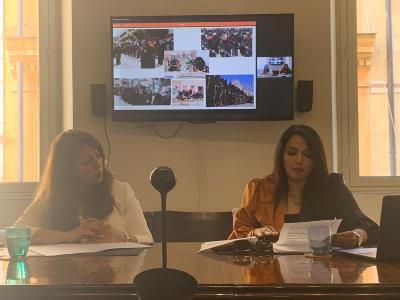EGIC conference: 'Serious action must be taken' in Yemen

ROME - More needs to be done on an international level to assist in the ongoing conflict in Yemen was the takeaway message from the ‘A Frontline, Female Perspective on the Houthis Siege of Yemen' event hosted by the Euro-Gulf Information Centre (EGIC).
The discussion took place at the EGIC headquarters in Rome but was also simultaneously live streamed around the world on Wednesday evening.
The event was introduced by EGIC director Matthew Robinson who presented the panel which was made up of Tatiana Caldas-Löttiger, president of the Stockholm-based International Women in Business think tank, together with Dr Wesam Basindowah, a professor in international relations and human rights expert.
The moderator for the evening, Caldas-Löttiger opened the evening by asking what motivated Dr Basindowah’s activism to which she replied: “It’s easy to just enjoy my life and to not talk about what is really happening, but really as a human and as an activist I cannot see the criminal militia destroy my country’s future and keep silent.”
“It’s my country and my people deserve it.”
Dr Basindowah, who had recently returned from the Human Right Council in Geneva, began her speech by talking about the Houthi militia, who she described as an “extremist, racist movement” likening them to the Nazis. She explained how their dynastic belief system was an aspect of religious fundamentalism in the region and how “the war in Yemen is by the racist Houthis militia who reject the others and want to implement an Iranian style regime against the Yemen people”
She drew attention to the terrible suffering that people have face since the conflict began in 2014, and especially focusing on the plight of woman.
“There are so many examples of discrimination against woman and of using systematic, physical, psychological, economic and verbal violence against woman and young girls. The war crimes they are responsible for are a daily occurrence.”
Dr Basindowah then moved on to discuss the issue of humanitarian aid – a vital supply source to a country that the UN warned back in 2018 could have 13 million citizens facing starvation and famine.
“Everybody talks about the humanitarian crisis in Yemen but nobody talk about the fact that the Houthi militia obstruct it.”
She also then underlined the important role that other countries have to play in resolve the crisis.
“We need to work together with the international community and we must do more work to put pressure on this terrorist militia. Put sanctions on them and try their leaders in international courts as war criminals.”
“The international pressure is always on the wrong side. They always pressure the government but not the Houthi.”
“There is a special UN envoy that was extended for three months but we need to do more to pressure people and to get to negotiating. They [the Houthi] refused all negotiation.”
Another key way the international community can put pressure on the Houthi is by designating them as a terrorist group and Dr Basindowah highlighted how this would be an important step in the process of bringing peace to her country.
“For me and my people we want more pressure on the terrorist militia and protection from the violence against the Yemeni people. We want them to be labelled officially as a terrorist group. If they get put on the terrorist group list, we can face this problem with more power.”
The evening was then rounded off by a few words from Matthew Robinson who thanked Caldas-Löttiger for her moderation and Dr Basindowah for her insight. Robinson concluded by saying, “We shouldn’t sugarcoat what goes on in Yemen at the hands of the militia. Too often we do and we pass our words but we shouldn’t and you’re right they’re a racist terrorist organisation and more people in Europe should be open about that."
jd
© COPYRIGHT ITALIAN INSIDER
UNAUTHORISED REPRODUCTION FORBIDDEN


